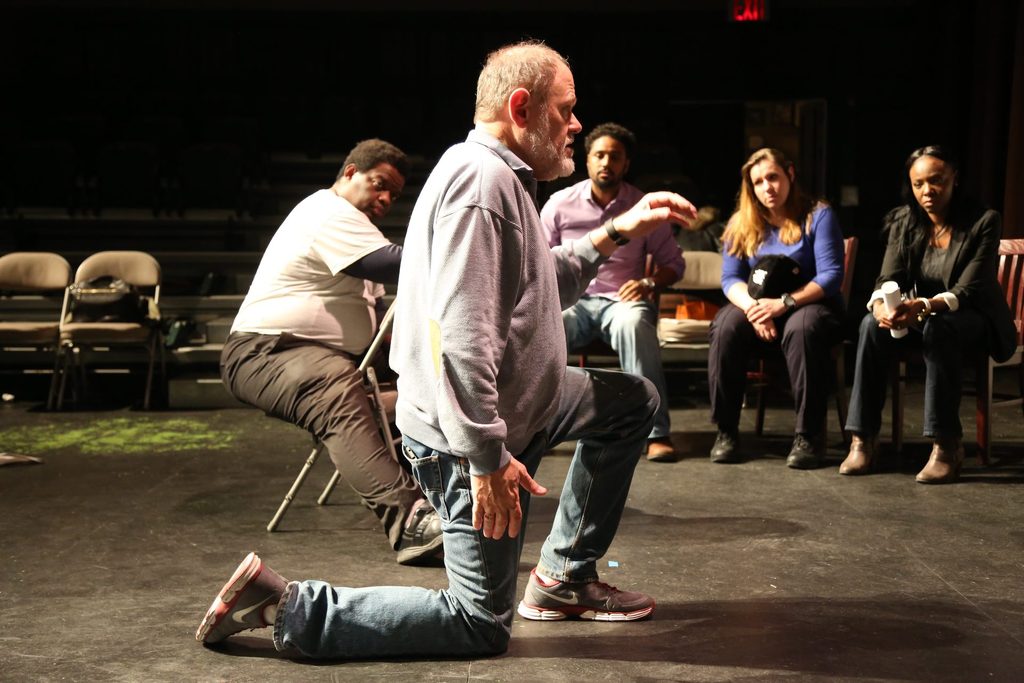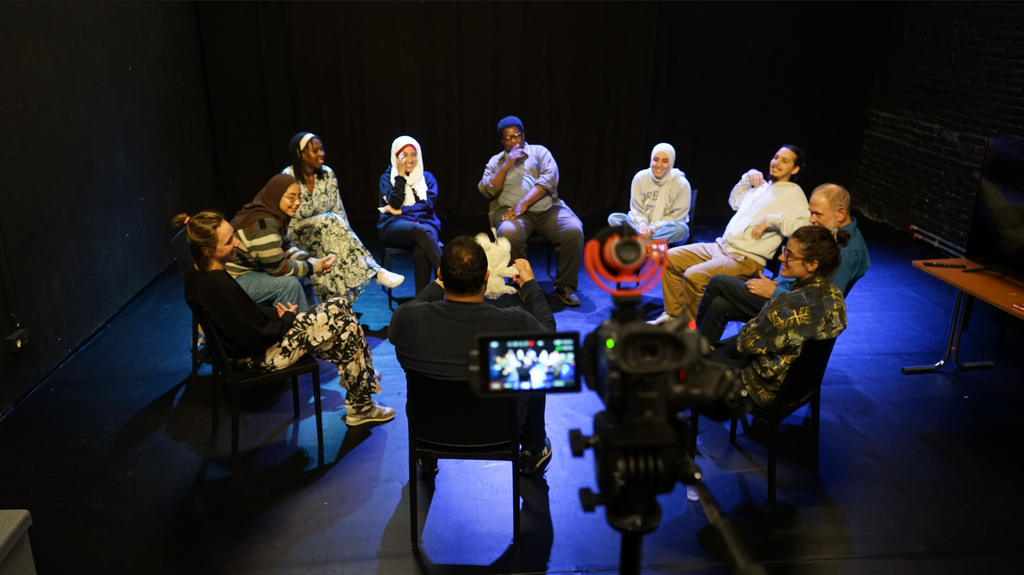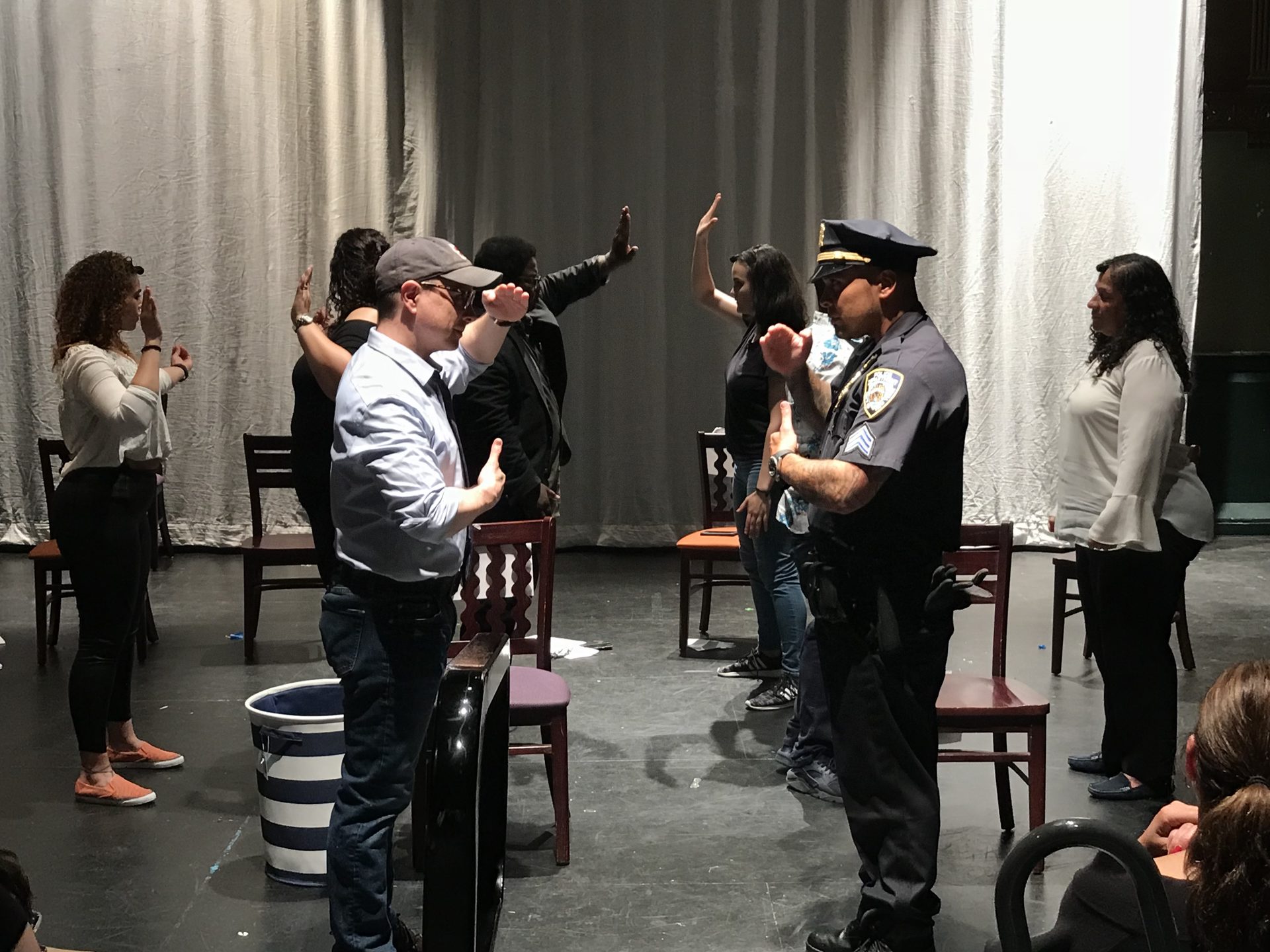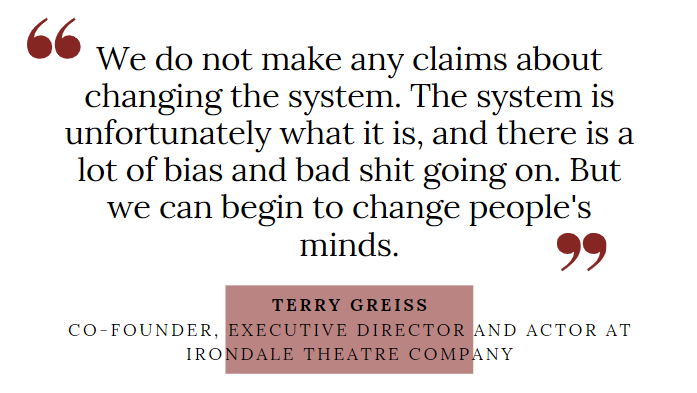From the presence of terrorist groups to high poverty rates, drug trafficking and increased crime, Molenbeek's many challenges have led to tensions between police and locals – often made worse by insufficient police training and poorly prepared officers on the ground. Now, a local theatre group wants to smash these social barriers.
In recent years, fear and anger have often triggered unrest and violence in the Brussels municipality, both by and against the police. Long-standing racial tensions between the force and the city's migrant population soared after the deaths of Adil and Ibrahima, exacerbated by heavy-handed policing during the pandemic and the Black Lives Matter protests.
As culture can often be a catalyst for change, local Molenbeek theatre troupe Ras El Hanout invited a Brooklyn-based company – Irondale Ensemble Project – to Brussels to share their socially-minded theatre production called 'To Protect, Serve and Understand' – a project aimed at easing tensions between local officers and civilians by bringing them together on stage.
"Our aim is to build bridges, to help people understand each other, even though they might be living in very different bubbles and may experience different realities," Mohamed Salim Haouach, General and Artistic Director of Ras El Hanout, told The Brussels Times.
Different contexts, same solutions?
While it is not sure that the project will be as successful in Molenbeek as it has been in Brooklyn, Haouach underlined that the stories shared between the members of the American theatre troupe and Ras El Hanout are, in fact, very similar.
"The context is different, but when we look at the dynamic between the police and civilians, we see a lot of the same issues. Still, we will have to see if that also means the same solutions can work. This is an experiment," he said.
The idea for To Protect, Serve and Understand came to Terry Greiss, who is a co-founder, Executive Director and actor at the Irondale theatre company, in 2014 after the death of Eric Garner in New York. A viral video showed the arrest of Garner, an African American man, who died after a police officer put him in a prohibited chokehold.

Terry Greiss. Credit: Irondale Ensemble Project
"This tragic death was of course a shock to everybody, but they kept showing the video of it over and over and over again," Greiss told The Brussels Times. "You go through these stages: there's shock, there's grief, but then all of a sudden there's this numbness because you have seen it so many times."
"When I started watching with a certain level of detachment, I noticed that many non-verbal signals – very clear cues – were being missed." Garner was communicating with a very specific body language, and so were the police, Greiss explained. "Because of prejudice, habit, or maybe just poor training, these signals were not being picked up on by the other party."
Angered by what he saw, he sent a letter to the New York police commissioner, telling them that the police need the kind of training that actors get: training in how to listen, how to respond to stimuli, how to communicate.
Two days later, Greiss was asked to set up a pilot project.
Seeing through someone else's eyes
"This theatre company is 40 years old and we have been doing this kind of work for years," he said. "We have worked with school teachers, incarcerated people, homeless people – always using improvisational theatre as a way to communicate more effectively, to develop empathy, to tell authentic stories."
Greiss has been running the police project for eight years now, bringing together seven officers and seven civilians for one evening a week, ten weeks at a time, corresponding to 40 hours in total.
While the workshops always start with all officers sitting together and all civilians sitting together, he noticed over the years that the divide breaks down as weeks go on and participants get to know each other as human beings – through conversations, playing games and improvisational theatre, such as studying each other’s speech mannerisms and gestures.
Slowly, they start to understand how that other person, who is very different from them, thinks, said Greiss. "It is amazing how that opens windows for people to say ‘I never thought of it like this before’ and see things from a different point of view."

Credit: Raz El Hanout theatre company
In Brussels, the aim is to present the project in a condensed form: scaling it back from ten weekly blocks of four hours to five days of six hours in one week, during which they will be working with four police officers and four civilians.
Molenbeek police's participation in the project is part of a larger push to start a dialogue with locals, which has also included a school play and a number of round table discussions between students and officers of the Brussels-West Police Zone.
"The police zone wants to build bridges with its residents and more specifically with young people, through small initiatives," Johan Berckmans, Police Commissioner of the Brussels-West Police Zone, told The Brussels Times. "We need not deny that there is a breach of trust between certain young people and the institution of the police. Racism, discrimination, and diversity are points that need to be worked on."
Therefore, four officers with extensive field experience volunteered for the theatre project. Whether the American project will be applicable in Brussels or Belgium is not sure, but the police are "convinced that all small efforts can have a major influence" on their job and "contribute to improving relationships with certain people."
In the long run, Haouach of Ras El Hanout hopes that the project will succeed in teaching the participants to see things from a perspective that they are often not used to. "I don't think a police officer gets up every morning with the intention of harming civilians and being the worst cop ever that day. But that does not change the reality that some parts of society feel like the police are not willing to protect them."
"There is a large gap between the intention and the perception," Haouach added. "If we want things to change, we need these deep moments of really listening and genuinely trying to understand each other, we need to communicate with each other."
One step at a time
The training is incredibly simple, if not always easy, stressed Greiss. "At its core, it is really all about listening. Not in a prepackaged one-size-fits-all kind of way, but listening to everybody in the way they need to be heard and then communicating back in that same language."
Still, the project does not make any claims about changing the system. "The system is unfortunately what it is, and there is a lot of bias and bad shit going on. But we can begin to change people's minds. And those people go out and vote, and they have families and they talk to their colleagues."
This, Greiss believes, is where the project can make a difference: not on a grand scale, but step by step, person by person. Sometimes it only happens months later, but when it does, it is very gratifying. "They say change only happens in secret, and it is always incremental. We may only move the needle a tiny little bit, but that has to be enough."


